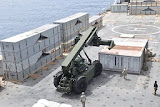Delivering a speech at the 15th edition of the Islamic Summit of Heads of State and Governments of the Organization of Islamic Cooperation (OIC) in the Gambia on Saturday, he said that “beyond doubt, this time period will also pass by, despite all its hardships and adversities for the Palestinian nation.”
“However, the manner and quality of the role that is played by us, Muslim states, in the face of this crisis will go down in history,” the top diplomat added.
“Undoubtedly, severance of diplomatic and economic ties and imposition of practical arms and trade embargo on Israel serves as an important means of cessation of its genocide in Gaza and atrocities in the West Bank and the Noble al-Quds.”
Amir Abdollahian stressed that what the resistance did in the course of time proved that its elimination was nothing but an illusion.
“The Israeli regime is not a legitimate government. It is only an occupying apartheid power,” he said, adding, “Passage of time is not going to lend legitimacy to an occupying power.”
“There is no doubt that severing diplomatic and economic relations and practical arms and trade embargo is an important tool in stopping Israel’s genocide in Gaza and its crimes in the West Bank and Al-Quds Al-Sharif. We sincerely appreciate the Muslim and freedom-loving governments and countries that took action in this direction,” he continued.
Iran’s top diplomat also noted that the realization of stable and just peace and security in the region is only feasible through the end of the occupation of Palestine, Syria and Lebanon, the return of Palestinian refugees to their homeland and guaranteeing the reinstitution of their right to self-determination.
He pointed out that the public opinion of the world and especially the Islamic world strongly expects us to come up with important recommendations and measures as the result of this Summit.
The foreign minister then proposed the following measures:
1. Emphasizing the establishment of an immediate, complete, unconditional and permanent ceasefire in all areas of Gaza, including in Rafah and even the West Bank;
2. The complete lifting of the human blockade of Gaza;
3. Exchange of prisoners;
4. Obligating the Israeli regime to conduct an immediate, complete and unconditional withdrawal of all military forces and their equipment from Gaza and securing an international guarantee for the safe return of the people to their areas and places;
5. Imposing an immediate arms and trade embargo against the Israeli regime;
6. Supporting the provisional binding order of the International Court of Justice and providing the ground for the trial and punishment of all the commanders and the perpetrators of Israeli crimes. To ensure peace and security in the region and the Islamic world, the rogue and occupying Israeli regime must be stopped, brought to justice and punished.
He highlighted that Tehran believes that in line with the efforts to materialize the motto of enhancing unity and solidarity through dialogue for sustainable development;
First, by focusing and investing in human resources, technology and infrastructure, Islamic nations may very well utilize their great capacity to achieve the goals of sustainable development of Muslim nations.
Second, in order to deepen the level of cooperation and spread sustainable and all-round development, the network of economic, technical, developmental, commercial and financial-monetary cooperation between Islamic countries should be further strengthened in the context of targeted and joint agreements and mechanisms.
Third, creating a dedicated platform within the framework of the Organization of Islamic Cooperation to share knowledge, expertise and resources related to sustainable development is necessary for the realization of the development plans of Muslim nations.
Fourth, it is a necessity to promote the economic and commercial integration between the member countries of the Organization of Islamic Cooperation in order to achieve the goals of sustainable development, based on our values.
Fifth, making use of technological initiatives and innovations and the expansion of scientific research in order to advance the agenda of achieving sustainable development goals within the framework of the Organization of Islamic Cooperation requires the devising an appropriate mechanism.






